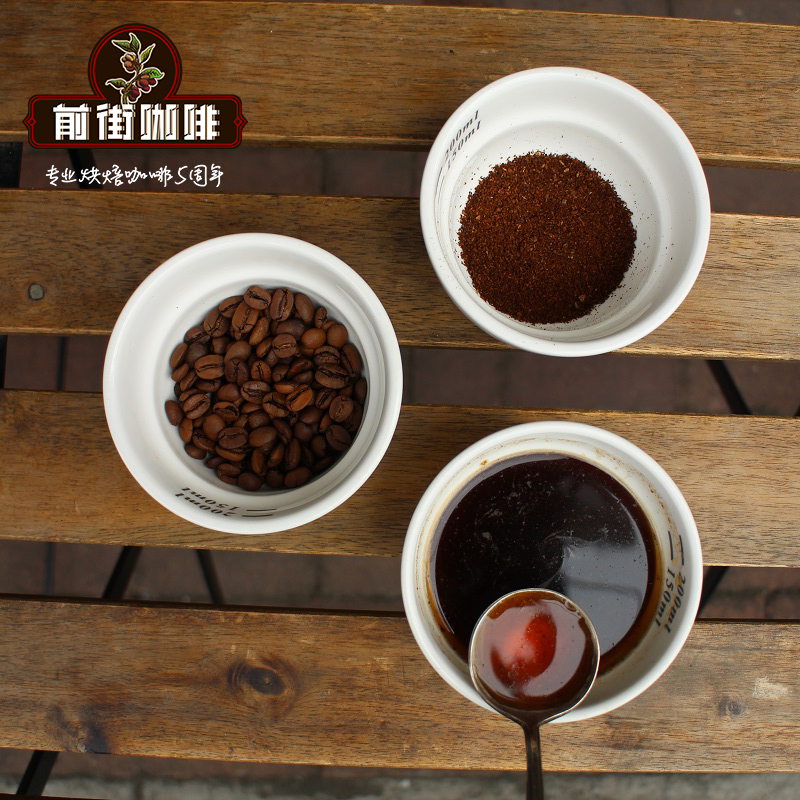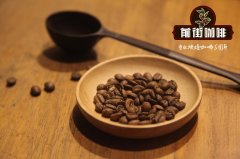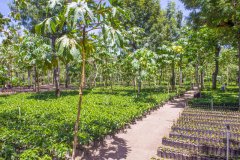10 questions about coffee powder at home

Professional coffee knowledge exchange more coffee bean information please follow the coffee workshop (Wechat official account cafe_style)
There is a lot of knowledge in drinking good coffee at home, from choosing beans, brewing methods to coffee utensils. What kind of adjustment tools do you need at home? How do you divide the types of coffee? Why not buy coffee powder? Now answer 10 questions about making coffee at home:
Q: there are many kinds of coffee brewing methods on the market. How should beginners choose?
Answer: there are four common brewing methods of boutique coffee: steam kettle (moka pot), siphon (siphon), hand brew (hand-drip) and ice drop (ice-drip). Moka pot uses steam to extract the taste of coffee at high temperature, magnifying the characteristics of the coffee itself. The brewed coffee is the predecessor of Italian espresso and has a strong and bitter taste. The siphon pot uses the vacuum principle to heat the lower pot, pump the hot water into the upper pot with coffee powder, turn off the heat, and then let the coffee flow back to the next pot. Although the taste is strong, it is more layered than moka pot coffee, emphasizing the flavor of the coffee itself. Hand coffee is the most convenient. Pour hot water into the filter paper with coffee powder and wait for the coffee to flow into the pot. The taste is similar to that of siphon coffee and the taste is meticulous. Ice drop coffee is the most time-consuming. It takes at least three hours to put 3 °C to 4 °C ice water in the pot and let the water drop into the coffee powder and then filter into the next pot. Different from the general hot drink coffee, ice drop coffee will not be bitter, although the taste is light, but the taste is long, it is now popular "tea" (tea-like) coffee.
Q: what are the criteria for choosing "beautiful coffee beans"?
A: first of all, don't choose supermarket coffee beans. Boutique coffee emphasizes freshness, and the "tasting period" is only about one month, while coffee in supermarkets has long lost its proper flavor after a long period of transportation and storage. More importantly, don't buy coffee powder! Because good coffee needs to be ground and drunk, it will go bad ten minutes after exposure to air. For beginners, it is best to go to the local coffee roaster. Besides ensuring the quality, you can also ask the shop assistant for professional advice.
Q: it is often said that coffee beans can be roasted in three ways: shallow, medium and deep. How should a novice choose?
A: in fact, the roasting of coffee beans is not so simple. In the field of international coffee, we use "Agtron number" to refer to the chromaticity of coffee beans like pantone as an accurate roasting index. 55 represents moderate roasting, the number less than 50 represents darker coffee beans, representing deep roasting, and the number greater than 65 is light roasted beans. In terms of taste, light to moderate roasting enhances the original acidity and floral aroma of coffee beans; deep roasting reduces the original taste of coffee beans, while the bitterness of the remaining caffeine becomes stronger and stronger.
Q: what is good coffee with "layers"?
A: the so-called "hierarchy" actually refers to the changes in the taste of coffee at different temperatures. The sweet and bitter aroma of the newly brewed hot coffee is more obvious, but as the temperature drops, the flower flavor and fruit acid will become more and more intense, and the taste will be special. However, it must be noted that if you want to drink coffee with "layers", you must choose medium-and light-roasted coffee beans. Coffee brewed from deep-roasted beans, regardless of the temperature, will only taste all bitter and astringent.
Q: "Beautiful Coffee" must not add milk and sugar?
A: it is not recommended to drink coffee with sugar, because good coffee itself has a natural fruity sweetness, adding sugar will destroy the taste level and make the sweetness become single. With milk to drink more strong coffee like espresso, hand brewing, ice droplets and so on are not suitable. Moreover, the best temperature for brewing coffee is 60oC to 70oC, which has the smoothest taste and the sweetest natural lactose, which complements the rich coffee.
Q: how does the fineness of coffee powder affect the taste of coffee?
A: the roughness of coffee powder will directly affect the degree of extraction (extraction rate). To put it simply, young powder has more contact with water, which can make stronger coffee, but it is also easier to absorb the defective taste, while the coffee brewed from coarse powder has a lower concentration, but fails to take full advantage of coffee. Therefore, according to the brewing method, the quality of coffee beans and personal taste, the thickness of coffee powder should be changed. Even if the type of coffee powder is the same and the thickness is the same, you can adjust the taste that suits you by changing the amount of coffee powder.
Q: is there a so-called "golden ratio" between water and coffee powder in hand-brewed coffee?
A: the American Fine Coffee Association (Specialty Coffee Associationof America) has established the "Golden Cup Theory" (Golden Cup Theory). The ratio of coffee powder to water is 1:13. However, as everyone has different taste preferences, the proportion can be adjusted according to the taste. Water temperature is also the focus of hand-brewed coffee, the best water temperature is probably 83oC to 89oC, high temperature will cause coffee powder extraction (over-extraction), the beans are not thankless bitter taste into the coffee; low water temperature can not bring out the aroma of coffee.
Q: apart from coffee beans and brewing equipment, which equipment is necessary for getting started making coffee?
A: in the coffee industry, bean grinders are even more important than brewing equipment. The coffee powder produced by a good bean grinder is uniform in thickness and can accurately control the brewing taste; on the contrary, if the coffee powder is of different thickness, it will affect the flavor extraction and make the coffee full of miscellaneous smell. In addition, a standard electronic scale is very important because the ratio of coffee powder to water must be very accurate to maintain the quality of coffee brewed each time. On the market, there are scales with both timing and weighing functions, which is convenient to calculate the time and amount of coffee brewing.
Q: I've had very mellow coffee in Japan. Can I make Japanese coffee at home?
A: traditional Japanese coffee actually tastes bitter, because the older generation of Japanese like to smoke, and their taste is more adapted to bitterness. Generally speaking, office workers also use coffee as a pick-me-up, and bitter black coffee is naturally the first choice. In fact, modern Japanese coffee has long been out of tradition, the sour, bitter and sweet taste of the coffee is relatively balanced, and the taste tends to be smooth. If you want to make Japanese coffee at home, hand brewing is the most appropriate way.
Q: Japanese designs are always meticulous. Can a Japanese coffee maker help me make a good cup of coffee?
A: coffee brewing should be based on the temperature criterion. The Japanese coffee maker is focusing on constant temperature. The position of filter paper and coffee powder is made of brass for fast heat transfer, and the shape is also in the shape of a sealed funnel to keep the temperature. But note that Japanese-style hand-brewed coffee can not be drunk immediately. It is recommended that you leave the coffee for one to two minutes so that the flavor is completely distributed and the taste, level and taste are better.
Important Notice :
前街咖啡 FrontStreet Coffee has moved to new addredd:
FrontStreet Coffee Address: 315,Donghua East Road,GuangZhou
Tel:020 38364473
- Prev

Microbatches are built on the premise of "better quality" and hope to drive the whole upward
Professional barista exchanges Please pay attention to coffee workshop (Weixin Official Accounts cafe_style)"pick out" micro-batch methods There are many ways to "pick out" micro-batches, for example, because today's weather conditions are better, especially separate today's coffee beans from others, or a farmer's fertilization technology is better, so his production is separated from others, and so on
- Next

Understand coffee, the first step to become coffee powder, beans producing areas, classification, flavor take you into
Professional barista communication please pay attention to the coffee workshop (Wechat official account cafe_style) Coffee basic type of coffee is a daily drink for many people, living on flat land, it is difficult to see the growth of coffee trees, here are some quick summaries about coffee: Rubiaceae coffee evergreen flowers are white, fragrant coffee beans, are actually the seeds of coffee
Related
- Beginners will see the "Coffee pull flower" guide!
- What is the difference between ice blog purified milk and ordinary milk coffee?
- Why is the Philippines the largest producer of crops in Liberia?
- For coffee extraction, should the fine powder be retained?
- How does extracted espresso fill pressed powder? How much strength does it take to press the powder?
- How to make jasmine cold extract coffee? Is the jasmine + latte good?
- Will this little toy really make the coffee taste better? How does Lily Drip affect coffee extraction?
- Will the action of slapping the filter cup also affect coffee extraction?
- What's the difference between powder-to-water ratio and powder-to-liquid ratio?
- What is the Ethiopian local species? What does it have to do with Heirloom native species?

